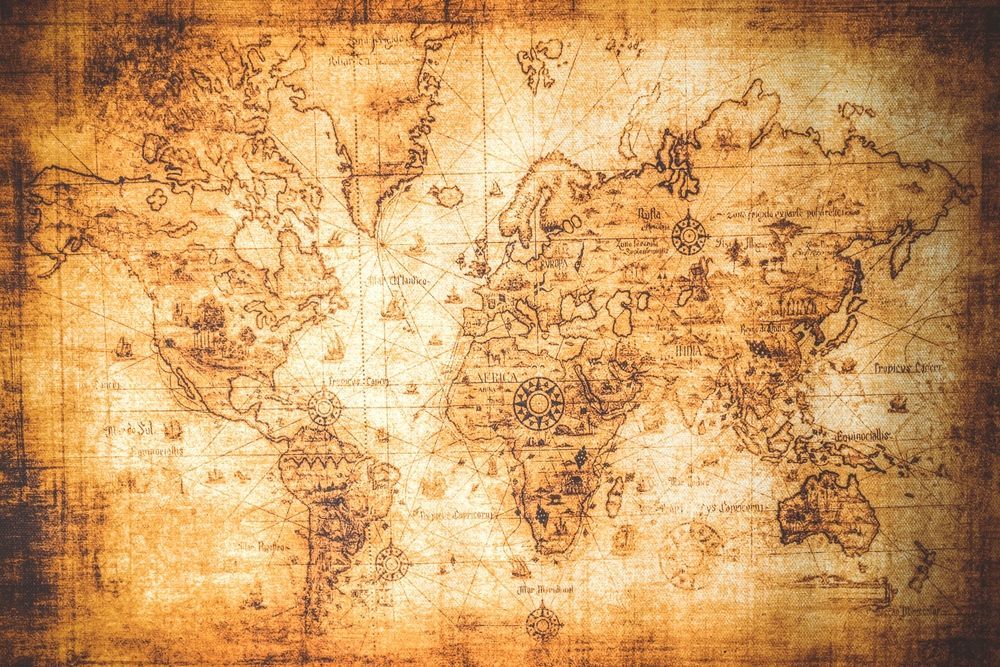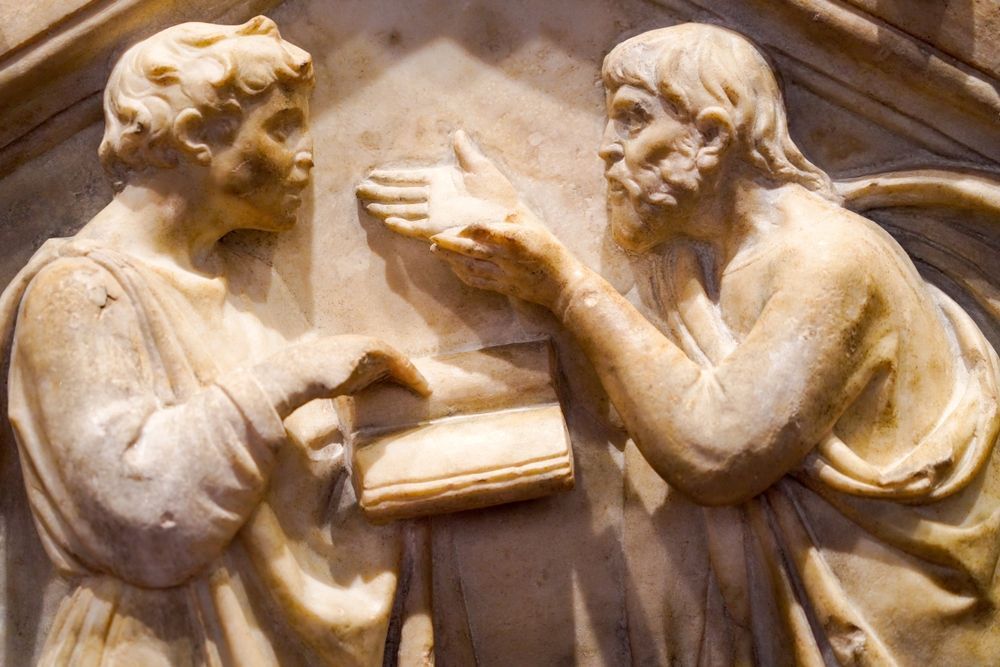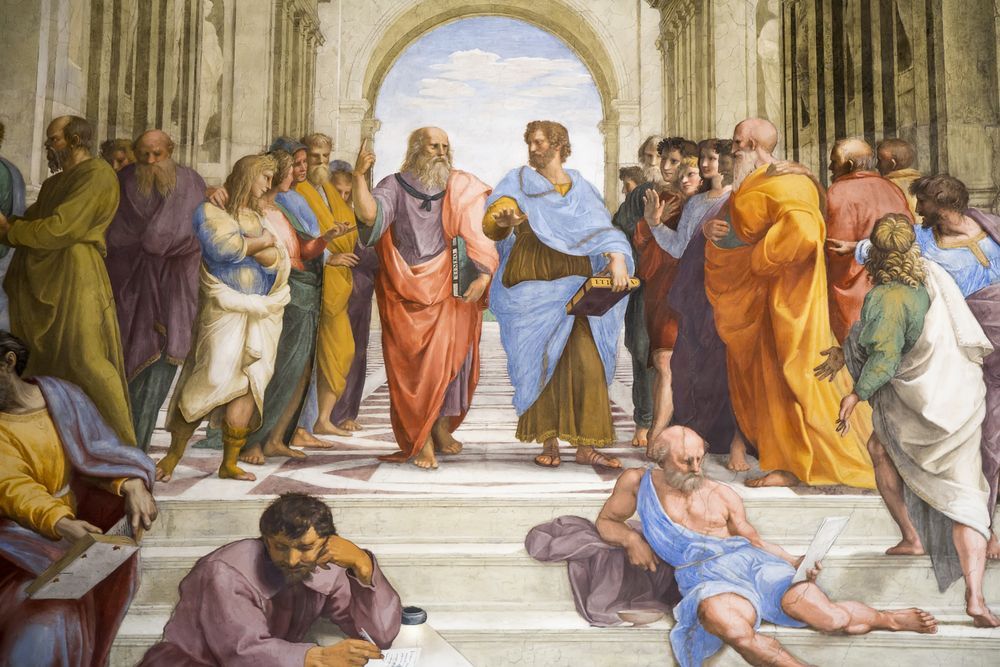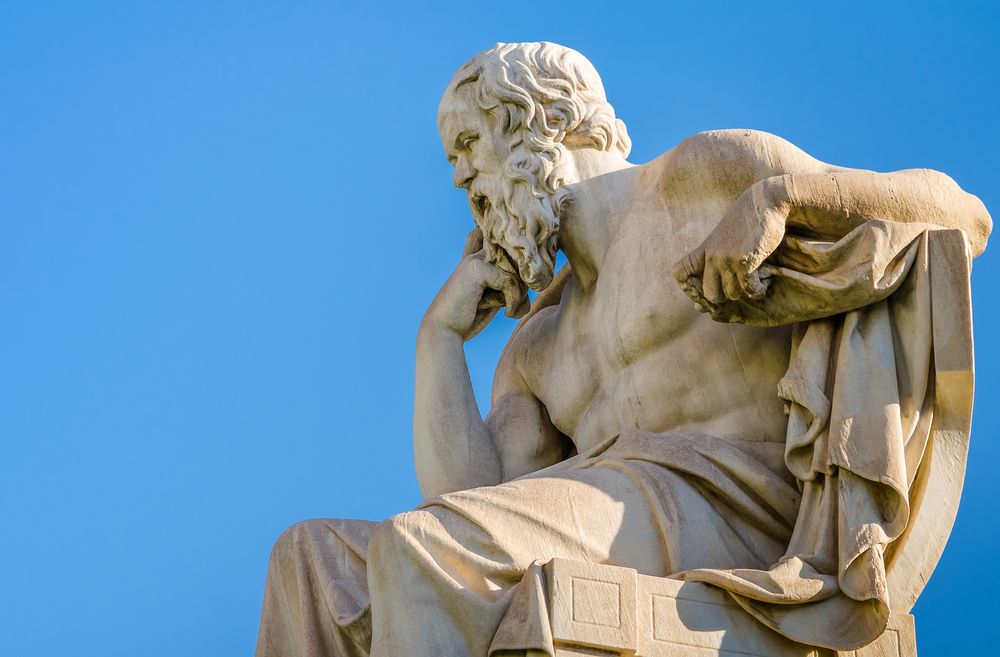October 10, 2023
An excerpt from Dao Feng He’s The Human Calling In comparing Chinese and Greek philosophy during humanity’s first great philosophical awakening, it’s not hard to see their similarities and differences. The two groups of philosophers, who never encountered each other, concerned themselves with four areas of inquiry, including how they operate and why: first, the nature of the relationship between humans and nature; second, the nature of relationships between humans and society; third, the analogous relationships between humans and society and between humans and nature, which are also homologous in their temporal and spatial dimensions; fourth, how methodologies of philosophical thinking and discussion can standardize, promote, and improve human thinking and imagination. These four areas of inquiry offer answers to questions of human calling . That is, how a person should recognize the world in which they live and the relationship between them and the universe, the relationship between people and things, and especially the relationships between people. How and why should people think and act in the world? How and why should they follow some guidelines and reject others? How and why should they face their own existence and death, and how and why they should think about and discuss these major issues in life? The reason philosophers from both cultures paid attention to and discussed these interrelated issues is because they’re the most fundamental problems human beings have faced since the start of agricultural civilization. The first problem they both tackled was how to stop or slow down the internal and external violence that arises in human life. This meant asking how to order community and public life to encourage better communities. Both Ancient Greece and China created organizations representing the interests of society: democratic city states and dynastic feudal states, respectively. Both types of states related in a certain way to private households and allowed for relatively simple tax collection for the public interest. But the two were very different. Ancient Greece was a civilization of city states in the Mediterranean islands. The combination of land and sea, as well as the openness and diversity of their trade patterns with other surrounding community states, gave them a more pronounced commercial DNA and a more obviously contractual basis for dealing with private and public issues. China, on the other hand, formed an agricultural society around the Yangtze and Yellow River basins and was therefore a relatively closed community. This resulted in a more obvious agricultural DNA when dealing with private and public issues and a more obvious tendency toward conquest and surrender. This could explain their differences in philosophical thinking. The second problem addressed was how individuals can anticipate their futures while unable to change the public order of community they live in. How could they both conform their life to that public order while also feeling joy, happiness, and meaning in that context? This question involved individual recognition of human calling but also certainly touched on a larger societal issue. Ancient Greece and China also differed in their philosophical inquiries. First, ancient Greek pre-Socratic philosophers nearly all emphasized the relationship between humans and nature. They sought to divine the nature and form of the world’s composition and existence. The public relationships between people and others may be influenced by the relationship between humans and nature. Among Chinese philosophers, only Laozi, Zhuangzi, and Mozi discussed this problem. Laozi and Zhuangzi’s discussion of the source of all things, dao , was not about deciphering the material structure and function of the natural world or the structure and function of the dao behind the phenomenal world. Rather, it was about affirming the supreme status of dao and guiding people to understand how they should act in this violent, ever-changing world. Only Mozi discussed natural philosophy like the ancient Greeks. Sadly, his ideas were never taken up by later thinkers. Second, the relationship between humans and society was raised and addressed to various degrees by most philosophers. Apart from Mozi and the Daoists Laozi and Zhuangzi, no one discussed whether human calling had any necessary or inevitable connection with existence beyond the material world. Confucians and Legalists were more concerned with the material. They were not interested in the abstract world beyond sensation. Confucianism was more concerned with common norms of behavior that people must adhere to when relating to others in public—its philosophical equivalent is the ethics of human duty . And these conventions and behavioral norms came from looking back to the previous dynasty in a way a baby always look to their mother, thinking she holds all the solutions to current and future problems. Ancient Greek philosophers, meanwhile, always turned their gaze to the gods. They thought universal, absolute truths were not found in the world of appearances but rather in the abstract world of the gods. This world existed prior to and would exist after life and the cessation of sensation, so truth and power can only be sought from God. Legalist practical philosophy, on the other hand, slipped into the practical politics of the public interest, emphasizing the power of harsh punishments to maintain order. It could be said that it bypassed human calling while going straight to human requirement , exchanging one form of violence for another, for the government was itself a violent mechanism with the intention of stopping violence. Only Daoist and Mohist thought discussed the metaphysical issue of human calling on the same level as ancient Greeks. They not only tried to answer why mankind needs a public order to coexist peacefully with others, but they also pointed out the path to realizing such an order and further uncovered the deep divine reasons in the invisible world for why mankind should think and act in this way. Third, regarding the homologous nature of the relationship between humans and society and humans and nature, ancient Greek philosophers expressed relatively obvious dualistic and humanistic polytheistic tendencies. A majority of philosophers believed that behind the material world there is a deeper, rational world. Nevertheless, the core elements that make up this deeper, non-phenomenal world differed. In the Milesian school, they were water, fire, air, or nothingness; in the Pythagorean school they were numbers, spirit, and soul; in the Elia school they were Mind and Eros, while water, fire, air, earth, and atoms were only materials used by them to form all things. Among the Socratics they were universal reason and highest existence; in Platonic thought they were sacred perfection and the eternal creator; in Aristotelian, the wise soul and eternal, unlimited, inevitable universal law of the gods. For the practical Cynics, it was the inner soul’s god-facing, wise virtue; for Epicurean hedonism, it was the godly and ordinary atoms composed of tiny atoms; the pre-existing concepts and philosophical reason of the Stoics with their ragged clothes and noble hearts; the sacred one and heart of the Neoplatonists school; the supreme light of God and intermediate soul of the Gnostics; and so on. But regardless of the differences between them, they all had a dualistic view of existence. They all agreed that beyond the physical world of sensory perception there was another world that could only be sensed through reason. Even the atomic theory of the Elia school, which many misread as monistic, was at its heart dualistic, since they believed the atoms that make up the material world are made up of Eros and Mind from another world. In fact, in this dualistic view, the first element is visible, individual, formal, and fluid. It wants to embody human ability and therefore participate in self-centered competition and struggle. Meanwhile the second element is spiritual and represents the “public spirit.” It is invisible and constant, a general law. Its core is love, compassion, goodness, and beauty. It wants to embody human calling through restraining selfishness, and transcend the first, physical element. It is the common origin of people and things in the physical world. It exists before us and does not disappear when we die. So human souls remain after they die, and join the higher existence of the spiritual world, whether it is “Mind,” “Eros,” “oneness,” or “eternal creator.” This dualistic worldview is the philosophical foundation of Western natural law. Whether it’s relationships between people or relationships between all things, all are governed by a homologous law. The search for how and why this homologous law was created eventually led the West to personal faith in God, which laid a solid cornerstone for philosophy. It could even be said that if it weren’t for the early exploration of the ancient Greeks, the philosophical foundation of the Christian faith would not exist and would never have been imagined. As far as dualistic thinking goes, the philosophers of China’s first axial age can be divided into two groups. The first is the Daoists and Mohists. On the surface they could be considered dualistic thinkers because the dao is different from the material world. To say that “ Dao creates all things” seems to imply that dao exists in a transcendent world while “all things” refers to the physical world. This means that Dao is the source of the physical world. But due to the inherent ambiguity in the ancient Chinese, the saying “Man rules Earth, Earth rules Heaven, Heaven rules Dao” could seem to imply that dao is a separate element from material things and the ultimate source of all things. Yet when you go on to read “ dao rules Nature,” following Laozi’s logic leads to the collapse of the dualistic worldview, since it seems to express a hierarchy of worlds rather than a dualistic worldview. Humanity follows the laws of the earth, the earth follows the laws of the sky, the sky follows the laws of the dao , and the dao follows the laws of nature. But isn’t nature all things? The world of dao follows the law of nature, but don’t all natural things partake in the birth and death of the physical? How can the eternal dao follow the law of living and dying things? How can dao still be the “source” as the creation of all things? Mozi, on the other hand, didn’t refer to the abstract dao but rather to Heaven’s will. He believed that spirits aid Heaven by meting out rewards and punishments that maintain mutual love and non-violence in the physical world, thus holding a relatively dualistic worldview. But he didn’t question or dig further into the common essence behind the relationships between humans and nature or between humans and society. His Heaven’s will idea loses its moral and sacred authority. As more spirits aid Heaven, these spirits lose their moral authority and slip into witchcraft and mysticism. Yet, Mozi explored the relationships between time and space in the physical world, movement and resistance in time and space as well as other mathematical relationships like points, lines, surfaces, and leverage. He is the only Chinese philosopher to have studied the relationship between the structure and function of all things in nature. The most fundamental difference between the worldview of the Chinese dualists, the Daoist and Mohists, and the dualistic worldview of ancient Greek philosophy is that the dualistic worldview of Chinese Daoism and Mohism is naturalistic in nature; in other words, the law behind all things in nature (either the dao or the will of Heaven) determines the law of human relationships. Thus, in Chinese philosophy, the hierarchy that places Heaven above earth is echoed in the difference between human beings of high and low status. This thinking could not possibly give rise to the idea that all humans are free and equal. This essential difference has profoundly influenced the diverging development of civilization in East and West. As for the Chinese monists, at least Confucians and Legalists lived and interacted more directly with the visible, physical world. They believed that Confucian ritual and laws, constraints, and orders, were just methods of organizing the monistic world. And this physical order’s hierarchy was based on their individual opinions. But they were not concerned with and did not recognize another world beyond what they could see and feel. They were not concerned with a meaning or power beyond the individual. They were even less concerned with agonizing over the meaning of life before life or life after death. They were only concerned with the public order of human life in the present. From the perspective of time, an individual life had no origin or future, unless it was placed in the physical context of blood flowing through the body. As a result, atheism and the veneration of ancestors were the logical cultural legacy of this monistic worldview only concerned with the material world. Fourth, the issue of philosophical methodology was raised in China, but only by Mozi. His analogical reasoning was truly unique. But in terms of the rigor and systematic nature of formal logic, it didn’t come close to Aristotle, which is why Aristotelian logic still guides both the social and natural sciences today. Modern natural sciences originated from natural philosophy, and social sciences originated from humanistic philosophy. Aristotle’s formal logic contained concept definition, scientific classification, empirical induction, and deductive reasoning, and was systematic and rigorous. However, in terms of methods of dialectical logic, the Daoist doctrine founded by Laozi was equivalent to contemporaneous ancient Greek’s Pythagorean school, not only it its discussion of how all things contain the unity of opposites, but also in its in-depth explanation that what we perceive as change in the material world is caused by opposing forces and the dao beneath all things. A wise ruler is called to recognize and follow the dao through “non-action,” which prevents him from acting recklessly. Individuals are called to recognize and follow this dao by seeking what makes them aware, at ease, and at peace. This control and grasp of the dialectical philosophical method is similar to the logic of “have, lack, change” Hegel articulated in the 19th century, 2,300 years later. This mastery and grasp of philosophical dialectics is as mysterious and profound as the Rig Veda and Upanishads of India, and has long influenced Chinese and Eastern thinking and cultural paradigms. Ancient Greek philosophy greatly furthered mankind’s ability to think and reason about human calling . It expanded the spiritual world imagined by humans in its dualistic thinking. This spiritual world was actually a space mankind created for the public spirit. It reached many pinnacles in humanity’s history of philosophy that have yet to be surpassed. But it still did not succeed in saving the ancient Greeks from their civilization’s tragedy. When Aristotle’s student Alexander the Great used his cavalry, swords, and fiery enthusiasm and natural talent for war, the brilliant culture of Ancient Greece spread far and wide. It swept through India, Central Asia, Asia Minor, Egypt, and North Africa. After victory Alexander the Great was like a Greek god of war in the realms of mortals. But after he had conquered the known world, his heart still longed for something more. There was no spirituality in the deep rationalism of his teacher Aristotle. So he went down along the Nile, through the jungles of Ethiopia and Uganda to mysterious Lake Victoria and asked a priest to tell him his fate and the secret of immortality. His fate was an early death, but his name will be known forever. The young and vigorous 33-year-old Alexander the Great was like the gods Uranus, Chronos, Zeus, and Dionysus in the Greek tragedies: able to defeat all their peers, but unable to defeat their own destiny. He abandoned his human empire in the mortal realm and left it behind. Subsequently the ancient Greek empire was quickly divided due to an absence of rightful heirs and declined gradually, making room for the Roman Empire and its philosophy of human calling , which was completely incomparable to that of the Greeks. Where, then, can we go to once again find the confidence, passion and diversity of answers that the ancient Greek philosophers brought to the question of human calling ? How can we avoid the fate of the gods and men of ancient Greek tragedy? What use are the ancient Greek philosophers to mankind’s quest for human calling ? These questions are left to the generations that came after. Chinese philosophers during the Spring and Autumn and Warring States periods, on the other hand, reached a different pinnacle in Eastern philosophical speculation. Their thought didn’t develop in the context of centuries of peace and democracy like that of the ancient Greek commercial city-state civilization. Rather it developed in an agricultural civilization experiencing hundreds of years of turbulence. As a result, it was not as quiet and calm as ancient Greek philosophy. This prevented Chinese philosophers from considering the purely spiritual side of the dualistic world. Instead, they spent more energy in reconstructing the public order of the physical world. Even Daoists and Mohists who deeply considered the dualistic worldview were inevitably dragged into the politicking involved in reconstructing public order in the physical world. As a result, discussions of human calling turned to more real-world discussions of how humans should behave, human duty , in Confucianism or how to impose the law, human requirement, in Legalism. To Confucians, without training in the thousands of conventions for thought and behavior encoded in the Zhou rites, which constitute human duty , a peaceful, ordered society could not be rebuilt. People could not become benevolent without understanding the spirit of ritual and music. Legalists, on the other hand, thought Confucian rites were useless, instead prescribing laws, constraints, and orders to impose the ruler’s authority and regulate people’s behaviors through human requirement . If violators faced harsh punishment, others would be deterred, and a non-violent order would naturally be restored. Legalist methods were used to build the insignificant State of Qin into a great empire that conquered and ruled all the other states. Confucian methods were used by the Han, which succeeded the Qin after its collapse. A combination of Confucianism and Legalism replaced the way of kings of the Zhou Dynasty, to pave the way for the hegemony of the Han Dynasty. Daoists and Mohists, meanwhile, were continually plagiarized by the Confucian-Legalist literati after the Song Dynasty, becoming phantom echoes in the culture. In this sense, the Chinese philosophy of the Spring and Autumn and Warring States periods was more practical than that of the ancient Greeks. But over time it lost focus on the issue of human calling , whether this was the question of human free will, the hope for goodness and beauty, or questions of human equality. It ignored fundamental questions of human life, such as spiritual freedom and equality, instead concentrating on a combination of human duty and human requirement in the material world. The spiritual world, which humans could only encounter at divinely appointed times, was missing altogether. But where is the individual, spiritual free will outside of public order? Is there another invisible world that exists beyond and prior to the physical one we perceive? How does a mortal man with no consciousness before birth and after death face his inevitable mortality? Is the overall public order of society really all that matters? Does a public order that demands an eye for an eye and castrates the free will of the individual harbor an even more horrific political violence? These questions were also left for subsequent generations. Read more in The Human Calling










